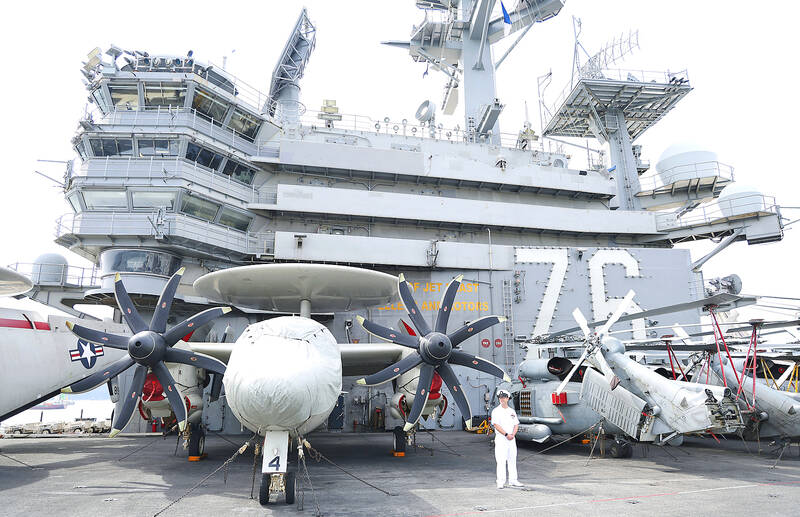North Korea yesterday criticized the arrival of a US aircraft carrier battle group in South Korea, calling it a provocation and again raising the specter of using nuclear weapons to defend itself.
The North’s latest nuclear threat came a day after the USS Ronald Reagan and its battle group arrived at South Korea’s southeastern port of Busan, following US-South Korean-Japanese naval exercises in international waters earlier this week.
South Korean defense officials said the carrier is to be docked at Busan for five days as part of an agreement to increase the temporary deployments of US military assets in response to the North’s growing nuclear program.

Photo: AP
The North’s official Korean Central News Agency (KCNA) yesterday called the aircraft carrier’s arrival “an undisguised military provocation” that proves a US plan to attack North Korea is being realized.
It threatened to respond in line with its escalatory nuclear doctrine that authorizes the pre-emptive use of nuclear weapons.
“The [North Korean] doctrine on the use of nuclear weapons already opened to public allows the execution of necessary action procedures in case a nuclear attack is launched against it or it is judged that the use of nuclear weapons against it is imminent,” KCNA said.
North Korea’s “most powerful and rapid first strike will be given to the ‘extended deterrence’ means, used by the US to hallucinate its followers, and the bases of evil in the Korean Peninsula and its vicinity,” KCNA reported.
North Korea has argued it was forced to develop nuclear weapons to cope with what it calls plots by the US and South Korea to invade.
It has often made furious responses to the deployment of US strategic assets such as aircraft carriers, long-range bombers and nuclear-powered submarines, as well as US joint training exercises with South Korean forces.

The death of a former head of China’s one-child policy has been met not by tributes, but by castigation of the abandoned policy on social media this week. State media praised Peng Peiyun (彭珮雲), former head of China’s National Family Planning Commission from 1988 to 1998, as “an outstanding leader” in her work related to women and children. The reaction on Chinese social media to Peng’s death in Beijing on Sunday, just shy of her 96th birthday, was less positive. “Those children who were lost, naked, are waiting for you over there” in the afterlife, one person posted on China’s Sina Weibo platform. China’s

‘POLITICAL LOYALTY’: The move breaks with decades of precedent among US administrations, which have tended to leave career ambassadors in their posts US President Donald Trump’s administration has ordered dozens of US ambassadors to step down, people familiar with the matter said, a precedent-breaking recall that would leave embassies abroad without US Senate-confirmed leadership. The envoys, career diplomats who were almost all named to their jobs under former US president Joe Biden, were told over the phone in the past few days they needed to depart in the next few weeks, the people said. They would not be fired, but finding new roles would be a challenge given that many are far along in their careers and opportunities for senior diplomats can

‘NO COUNTRY BUMPKIN’: The judge rejected arguments that former prime minister Najib Razak was an unwitting victim, saying Najib took steps to protect his position Imprisoned former Malaysian prime minister Najib Razak was yesterday convicted, following a corruption trial tied to multibillion-dollar looting of the 1Malaysia Development Berhad (1MDB) state investment fund. The nation’s high court found Najib, 72, guilty on four counts of abuse of power and 21 charges of money laundering related to more than US$700 million channeled into his personal bank accounts from the 1MDB fund. Najib denied any wrongdoing, and maintained the funds were a political donation from Saudi Arabia and that he had been misled by rogue financiers led by businessman Low Taek Jho. Low, thought to be the scandal’s mastermind, remains

Australian Prime Minister Anthony Albanese yesterday announced plans for a national bravery award to recognize civilians and first responders who confronted “the worst of evil” during an anti-Semitic terror attack that left 15 dead and has cast a heavy shadow over the nation’s holiday season. Albanese said he plans to establish a special honors system for those who placed themselves in harm’s way to help during the attack on a beachside Hanukkah celebration, like Ahmed al-Ahmed, a Syrian-Australian Muslim who disarmed one of the assailants before being wounded himself. Sajid Akram, who was killed by police during the Dec. 14 attack, and